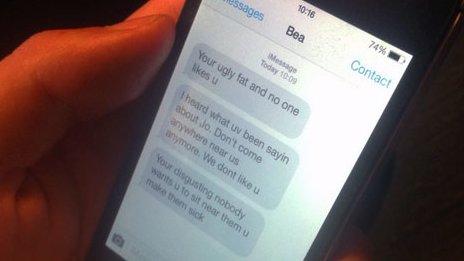Cyberbullying: How to keep safe online and deal with it
- Published

The charity Childline says it has seen a rise in the number of children contacting it with concerns about online bullying.
It saw 4,507 cases of cyberbullying in 2012-13, up from 2,410 in 2011-12.
The charity also saw a rise in concerns about self-harming, while depression and difficult family relationships were the top reasons for seeking help.
For the first time in the charity's history, more counselling took place online (59%) than by telephone (41%).
Peter Wanless, chief executive of the NSPCC charity which runs Childline, said: "The issues facing children today are very different from those that faced us as children.
"Stranger danger, for example, rarely comes up in contacts to Childline but depression, self-harm, online bullying and even suicide contacts are increasing exponentially.
"If we are to help young people we need to listen to what they are telling us about the issues they are facing."
Tips for staying safe online
Don't post personal information online, like your address, your email address or mobile number. Keep personal information as general as possible.
Never let anyone have access to your passwords. Check the privacy settings on accounts like Facebook/Twitter and make sure you know how to keep your personal information private.
Change passwords regularly.
Think very carefully before posting photos of yourself online. Once your picture is online, anyone can download it and share it or even change it.
Never respond or retaliate to negative posts.
Block any users that send you nasty messages on social media sites.
Never reveal your real name, your friends' names, where you go to school or your place of work.
Don't open emails, downloads or attachments from people you don't know or trust as they could contain a computer virus or unwanted messages.
Block spam emails and delete them.
Some ways of dealing with cyberbullying
Block the bully's email address, phone number and delete them from social media contacts. Report their activities to their internet service provider (ISP) or to any websites they use to target you.
Never respond or retaliate, this can just make things worse. It might be difficult, but try to ignore the bullies.
Get help. Talk to a parent, teacher, counsellor or other trusted adult.
Make a note of the dates and times of bullying messages, along with any details you have about the sender's ID and the URL.
Don't pass on cyberbullying videos or messages.
If you're being bullied repeatedly, think about changing your user ID, nickname or profile.
Don't ignore it. If you see cyberbullying going on, report it and offer your support.
Childline can be contacted on 0800 1111 or online at ChildLine, external
Follow @BBCNewsbeat , externalon Twitter
- Published18 December 2012

- Published8 May 2012
